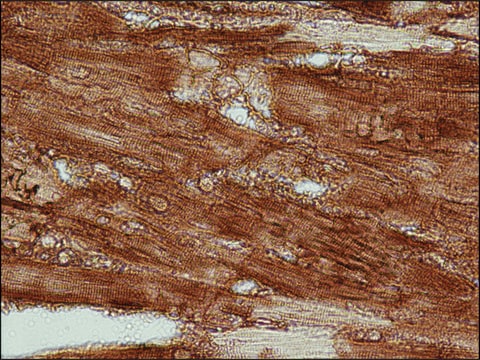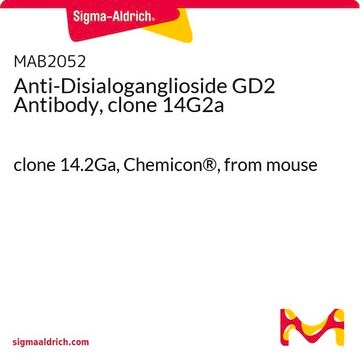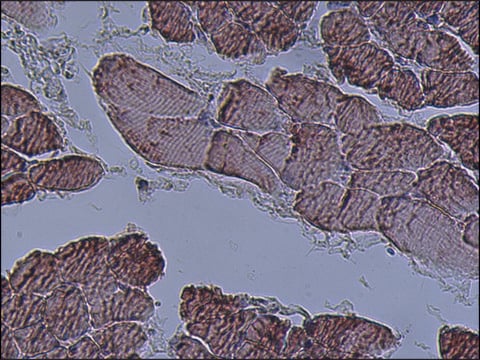A7732
Anti-α-Actinin (Sarcomeric) antibody, Mouse monoclonal
clone EA-53, purified from hybridoma cell culture
Synonym(s):
Anti-ACTN2, Anti-Actinin α2, Anti-CMD1AA, Anti-MGC107582, Anti-1110008F24Rik, Sarcomeric Alpha Actinin Antibody, Sarcomeric Alpha Actinin Antibody - Anti-α-Actinin (Sarcomeric) antibody, Mouse monoclonal
About This Item
Recommended Products
biological source
mouse
Quality Level
conjugate
unconjugated
antibody form
purified immunoglobulin
antibody product type
primary antibodies
clone
EA-53, monoclonal
form
buffered aqueous solution
species reactivity
cat, rat, fish, rabbit, sheep, bovine, goat, canine, pig, mouse, human, hamster, snake, frog, lizard, chicken
concentration
~1.0 mg/mL
technique(s)
immunohistochemistry (formalin-fixed, paraffin-embedded sections): 10-20 μg/mL using protease-digested sections of human tongue.
western blot: 2-4 μg/mL using rat skeletal muscle extract
isotype
IgG1
UniProt accession no.
shipped in
dry ice
storage temp.
−20°C
target post-translational modification
unmodified
Gene Information
human ... ACTN2(88)
mouse ... Actn2(11472)
rabbit ... ACTN3(100009544)
rat ... Actn2(291245)
General description
α-Actinin dimerizes in an antiparallel fashion via interaction of the central rod domains. Four isoforms are found in human and mice. α-actinin-1 is ubiquitously expressed and located primarily in focal adhesions, whereas α-actinin-4 is present in certain membrane ruffles and seems to play a role in endocytosis and tumor cell motility.
ACTN1 (α-actinin-1) and ACTN4 (α-actinin-4) encodes non-muscle proteins, while ACTN2 (α-actinin-2) and ACTN3 (α-actinin-3) encodes muscle proteins.
Monoclonal Anti-α-Actinin (Sarcomeric) shows wide reactivity, as it binds to human, bovine, pig, sheep, rabbit, goat, hamster, cat, rat, mouse, dog, chicken, lizard, snake, frog and fish α-actinin.
Specificity
Immunogen
Application
Immunocytochemistry (1 paper)
Immunofluorescence (2 papers)
Immunohistochemistry (1 paper)
Biochem/physiol Actions
Physical form
Storage and Stability
For extended storage, freeze at -20 °C in working aliquots. Repeated freezing and thawing, or storage in “frost-free” freezers, is not recommended. If slight turbidity occurs upon prolonged storage, clarify the solution by centrifugation before use. Working dilution samples should be discarded if not used within 12 hours.
Disclaimer
Not finding the right product?
Try our Product Selector Tool.
related product
Storage Class Code
12 - Non Combustible Liquids
WGK
WGK 1
Flash Point(F)
Not applicable
Flash Point(C)
Not applicable
Personal Protective Equipment
Certificates of Analysis (COA)
Search for Certificates of Analysis (COA) by entering the products Lot/Batch Number. Lot and Batch Numbers can be found on a product’s label following the words ‘Lot’ or ‘Batch’.
Already Own This Product?
Find documentation for the products that you have recently purchased in the Document Library.
Customers Also Viewed
Our team of scientists has experience in all areas of research including Life Science, Material Science, Chemical Synthesis, Chromatography, Analytical and many others.
Contact Technical Service















